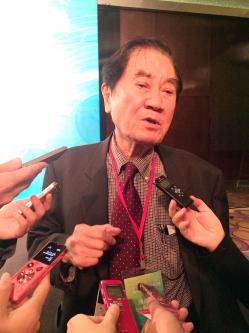Former minister of foreign affairs Mark Chen (陳唐山) yesterday engaged in a lively debate with a US representative on whether Washington “recognizes” or simply “acknowledges” that Taiwan is part of China, urging her to have a good look at the Shanghai Communique after she opted for the former.
Speaking at the Taiwan-US-Japan and Asia-Pacific Regional Partners Security Dialogue in Taipei, Chen brought up the recently much-
discussed “one China” policy of the US, saying that while then-US president Jimmy Carter switched diplomatic recognition from Taipei to Beijing in 1979, the Shanghai Communique signed by then-US president Richard Nixon in 1972 does not indicate Washington “recognizes” that Taiwan is part of China.
“I have to bring this up because many scholars have misinterpreted the ‘one China’ policy,” said Chen, chairman of the Prospect Foundation, which cohosted the seminar.
The truth is the “US has to this point never recognized that Taiwan is part of China,” he said.
“In the Shanghai Communique, the Chinese side states that there is only one China and Taiwan is part of China, but when it comes to the American side, it simply says that [the US] ‘acknowledges’ [Beijing’s] position that there is one China and Taiwan is part of China,” Chen said, adding that the US did not include the word “recognize.”
“Whenever the US talks about its ‘one China’ policy they are always accompanied by the so-called three communiques and the Taiwan Relations Act. In the three communiques, including the Shanghai Communique, the US has never recognized that Taiwan is part of China,” he added.
“Many scholars and commentators in Washington have mistakenly interpreted the ‘one China’ policy. This point has to be known. From my own perspective, of course, there is one China, there is no question about it. The question is whether Taiwan is part of China,” Chen said.
He then asked US Representative Madeleine Bordallo, a Democrat from Guam who was invited to join the dialogue between lawmakers from Taiwan, the US and Japan, for her take on the issue, and she said she was “not too sure about that.”
“I’m a member of the [US] Congress and I recognize you [Taiwan] as part of China,” she said.
Upon hearing this, Chen asked Bordallo to please “go back and study the Shanghai Communique” and “why whenever the US talks about the ‘one China’ policy they always say they abide by it ‘plus’ the three communiques and the Taiwan Relations Act.”
“I will,” Bordallo replied. “I will communicate that, but I don’t think all members of the Congress feel that way. I think they feel you are part of China.”
“That policy was set up years ago and they follow it, but we are very sympathetic toward Taiwan, whenever you ask for our help, we’re there,” she added.
Japanese Diet member Keisuke Suzuki weighed in, saying: “I think we have to see carefully what is happening in Hong Kong now.”
He said that Beijing’s “one country, two systems” was unrealistic and the Chinese leadership actually does “not allow such a thing.”
Chinese Nationalist Party (KMT) Legislator Johnny Chiang (江啟臣) said that while the US’ position has been “clear” in using the word “acknowledge,” the question is what US president-elect Donald Trump is going to do.
There are two possibilities: One, Trump is going to say outright that Taiwan is not part of China, and two, the Trump administration would someday say that the US “recognizes” that Taiwan is part of China, he said.
To this Bordallo said she wanted to “reiterate that we are presuming things here as we don’t know what the president-elect will do,” adding that Trump is “rather indecisive at this moment on many of his commitments [made] during the campaign.”
“Taiwan is not part of the People’s Republic of China,” Democratic Progressive Party Legislator Liu Shih-fang (劉世芳) said, adding that in the face of China’s rising assertiveness in the region, Taiwan should be included in future dialogues between the US, Japan and South Korea on regional security.
Dan Blumenthal, director of Asian Studies at the American Enterprise Institute and a former senior director for China and Taiwan at the Pentagon, said on the sidelines of the event that it is “very clear in the communiques and other understandings [that] the US sees the issue of Taiwan sovereignty as unresolved.”
“Certainly [the US] acknowledges China’s position, but does not accept it,” he added.
It is a matter that needs to be solved through “a peaceful negotiation between China and Taiwan,” he said.
Source: Taipei Times - 2016/12/15





















